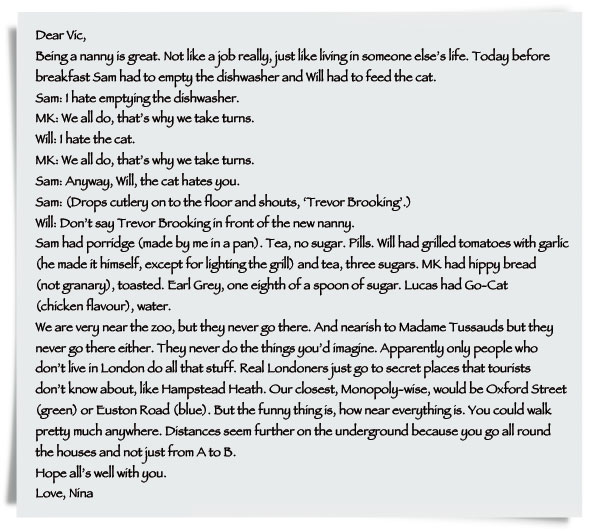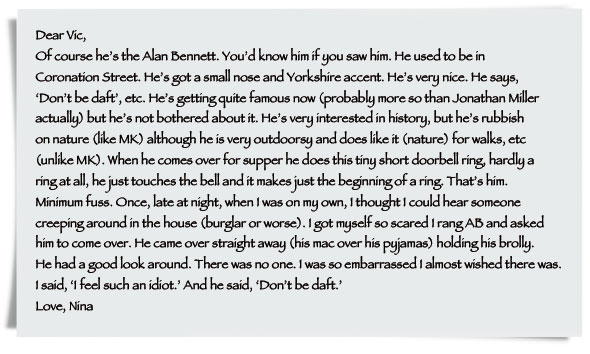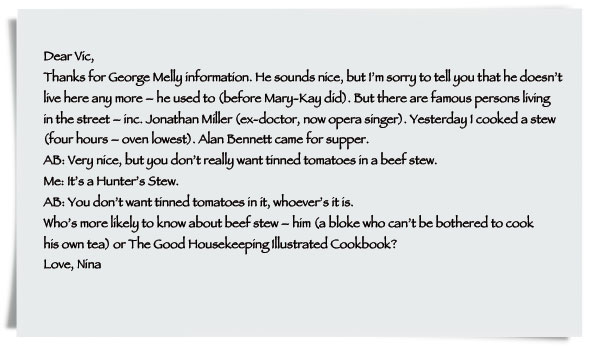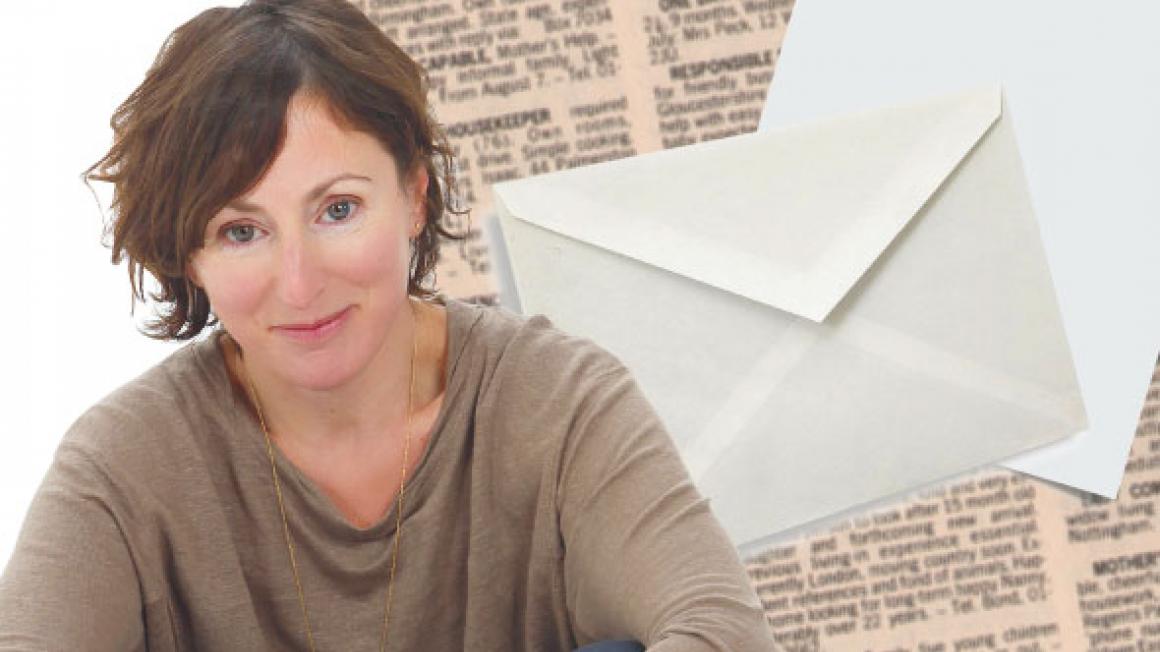From nanny to novelist...
Apart from the too-high central heating and wearing a silly white hat, I loved working there. The residents, mostly ladies, having lived through extraordinary times, were full of anecdotes, some funny, sunny and marvellous, others tragic beyond belief and hardly bearable. Being rather particular, they liked their routine.
They had the same breakfast every morning – a small dish of porridge or bread and butter with marmalade, which arrived on a tray at their bedside table at 7am. At 8am, the day staff would come on duty and help the ladies get dressed and into the ‘lounge’ where at 10 o’clock they’d be given a cup of milky coff ee and Lincoln biscuits. Lunch was at 12pm and afternoon tea at three, with some digestives or Battenberg cake.

During the week, there were certain activities that punctuated the days – things like bingo, which the nurses enjoyed as much as the residents; visits from the hairdresser and the chiropodist, and an important time every day between coffee and lunch when the ladies liked quietness. This was when they’d read and discuss their magazines, the favourite of which, by far, being The Lady. We referred to this period as ‘reading time’ and, though it wasn’t official, it was routine and we knew not to vacuum the stairs then.
I don’t remember what day The Lady arrived, which is odd, it being such an important part of our lives. Not just the ladies’ lives, but ours too. Staff ages ranged between 15 and 60, and I think we all read it. I remember the fascinating articles about Lady Di, horses, novelists, stories and recipes. Mainly though, I loved the advertisements in The Lady’s famous classifi ed section – looking for nannies, housekeepers and live-in companions, and off ering cosy cottages in rolling countryside or smart rooms in London and the use of a car.
I remember an article about dogs making people feel more relaxed and contented, which caused the cook to bring in her spaniels regularly, and that did indeed make everyone feel contented.
 From left: Nina; her charges, Sam and Will; Nina and Sam Frears play pool
From left: Nina; her charges, Sam and Will; Nina and Sam Frears play poolSo, a couple of years went by and I was still working at the nursing home and living at home when some of my friends began to go to university, and colleagues went off to do their nurse training in town, or far away, even to London – and I began to regret leaving school
having the option of a whole new life.
After a short time of moping, as I watched my brother choosing his university course, it dawned on me that the people seeking cheerful nannies (who liked children and dogs and could drive) in The Lady classifi eds, were looking for people like me.
I was cheerful, I liked children, loved dogs and had just passed my driving test.
I applied for a couple of jobs by letter (stating that I had a clean driving licence and could cook) and in September 1982 I began my job as nanny to two boys, Sam and Will, working for Mary-Kay Wilmers (the co-founder and editor of the London Review of Books); it was also in the middle of an extraordinary group of talented, creative people living on Gloucester Crescent in Camden Town.

Our neighbours included Alan Bennett, on the brink of becoming a ‘national treasure’, who would often appear in our kitchen at suppertime with a salad and, occasionally, Russell Harty, the TV celebrity. A few doors down was the writer and broadcaster Dr Jonathan Miller (from whom I borrowed a saw), the author Deborah Moggach (who looked at my mum’s poems and declared them ‘very good’), biographer Claire Tomalin and Michael Frayn.
I met writer colleagues and friends of Mary-Kay and, through the boys’ father, film director Stephen Frears, I bumped into the odd famous actor. And I became friendly with other nannies nearby. Looking back, it was an incredible group of people to live among, but to me at the time, they were just our neighbours who might or might not have an onion or know
and not whether or not Arsenal or West Ham had won.
 From left: Nina loved reading articles about Lady Di; neighbours 1 Alan Bennet 2 Deborah Moggach 3 Dr Jonathan Miller
From left: Nina loved reading articles about Lady Di; neighbours 1 Alan Bennet 2 Deborah Moggach 3 Dr Jonathan MillerI wasn’t the hardest-working or most conscientious nanny ever. I didn’t do much housework. I served up barely edible meals when it was my turn to cook, accidentally dyed the clothes green and scraped the car numerous times. But my boss didn’t seem to mind, caring more that I was settled and happy and that the boys and I had a reasonably nice time, which we did.
I got to know and love London just through carting the boys about – to drama classes, Great Ormond Street Hospital, sporting fi xtures and going to see fi lms. And, encouraged and inspired by those around me, I even managed to get myself on to a college course.
Most importantly though, I met Mark Nunney (the volunteer helper of Claire Tomalin’s son Tom, who lived two doors away), and with whom I now live and have two children and a dog, and might even marry one day.

I used to write letters home regularly to my sister in Leicestershire, full of the funny anecdotes that have recently been published in my book called Love, Nina. Since the book came out people have often asked how it all happened. How I got the job, how I got to college, how I changed my life.
‘I saw an advert in The Lady magazine’ I say. And they usually reply, ‘Ah, of course.’
Nina, by Nina Stibbe, is published by Penguin, priced £8.99.


